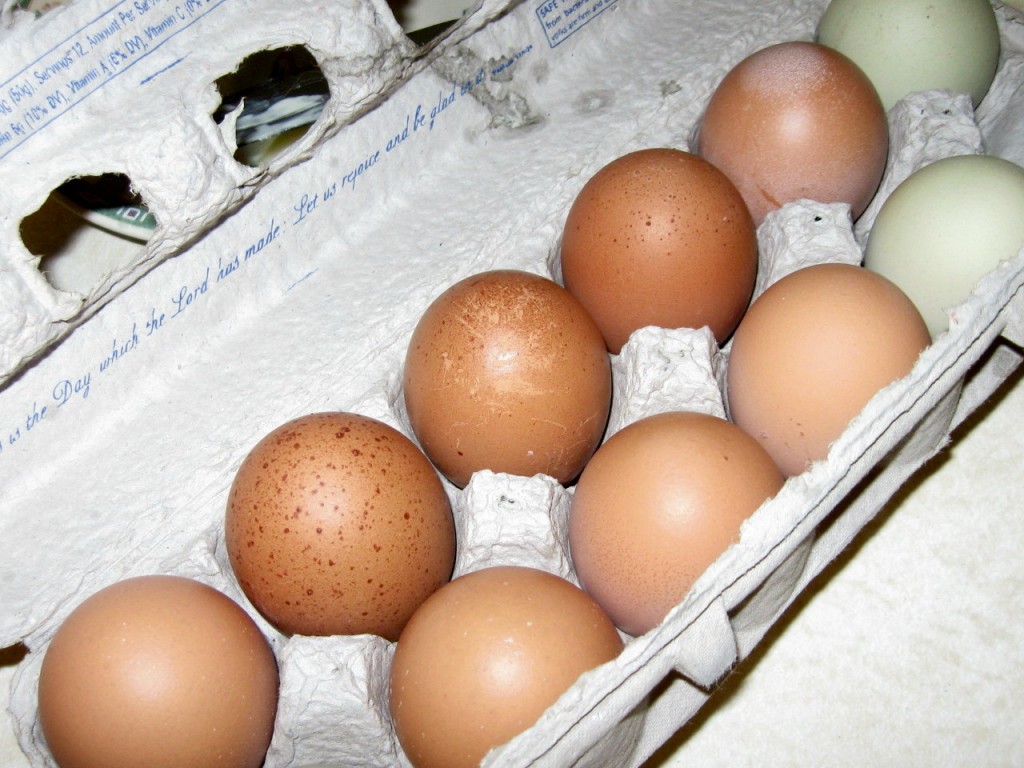This week I get to feature my favorite local ingredient–eggs!
Vegetables are probably the first foray into local eating for most people. The second would be eggs. They are fairly inexpensive (compared to grassfed meat). They also taste infinitely better than anything you can buy in the store, even those labeled as “free range organic.” The first time I tried them, I was amazed at how beautifully yellow the yolk was, and how much richer they tasted.
You can try to raise chickens yourself, find them at farmers markets, or find someone else who has chickens and too many eggs. In the spring, you can even try to find duck or goose eggs at the farmers market for an even more interesting experience.
Here are the top 5 things I’ve learned about eggs over the years:
1. Don’t toss the yolk!
Mother nature cries every time a yolk is thrown away. That’s the most nutritious part! Although it does contain cholesterol, eating cholesterol has no affect on your cholesterol levels.
2. Eggs are a perfect fast food.
No thawing required. Just crack, scramble, and breakfast (or dinner) is ready. For more nutrition, add any type of vegetable to the scramble, or get fancy and make an omelet or frittata.
3. The color of eggs is determined by the breed of the chicken.
And, it really doesn’t have anything to do with the nutrition content. For fun, you can check out this chart of chickens and their egg colors. Talk about a natural way of getting multicolored Easter eggs! (Note: for those of you concerned about dyeing eggs, do what my Mom always did – poke a hole in the top and bottom, blow out the whites and yolks, and dye the empty shell–then have scrambled eggs for dinner.)
4. Chickens are not vegetarians.
If they are living outside, with access to grass, they are most likely eating bugs. What that label really means is that they are not being fed other chicken byproducts (I know, gross, right?) Visit my friend Katie over at Kitchen Stewardship to decode other egg labels and terms.
5. Raw eggs won’t kill you.
Especially if they are from healthy chickens. For more on raw egg safety, check out my friend Kelly the Kitchen Kop’s post “Are raw eggs safe?” While I wont’ be making any raw egg smoothies any time soon, reading it did make me feel better about using raw eggs in homemade mayonnaise.
Make sure you check back throughout the week for more information about eggs, our theme for this week’s Back to Basics series.
This post shared at Kitchen Tip Tuesdays, Frugal Friday, Works for Me Wednesday



Totally agree with everything! We’ve raised our own chickens since I was a young girl, but this winter they stopped laying for a while so we bought a dozen from our local store. I couldn’t believe the taste and texture difference! They were so gross!
I don’t know who came up with the idea that yolks aren’t healthy, but you’re right! It’s not true! In fact, the white is much harder to digest, and it’s the part causes allergies!
I’m trying to remember what food book I read this in, but can’t at the moment. However, it said that the upper limit of 300 mg/cholesterol per day is a totally made up number, NOT founded on any evidence that more will harm you. At the time the recommendation was made, the avg consumption was something like 246 mg/day, so they just thought 300 sounded good!
I’m with ya on the raw eggs-if we didn’t raise our own, I probably wouldn’t do it!
I love fresh eggs, but haven’t been able to talk hubby into letting them on the ‘farm’. Leaving that to my 2-year-old, lol. Love the things you point out about eggs here. Visiting from WFMW.
~Kimberlee, The Spunky Diva
I’d always eaten store eggs until recently, when my parents’ neighbors started trading them eggs-for-corn. The (free-range? organic? corn-fed? I’m not sure what all they do differently) eggs have a brighter yolk and taste different.
I have a family full of heart disease and a degree in biochemistry, and my research indicates that eating a reasonable amount of eggs (or other cholesterol) is fine. In fact, scientists aren’t even sure that high cholesterol causes heart problems, just that people with high cholesterol tend to have heart problems.